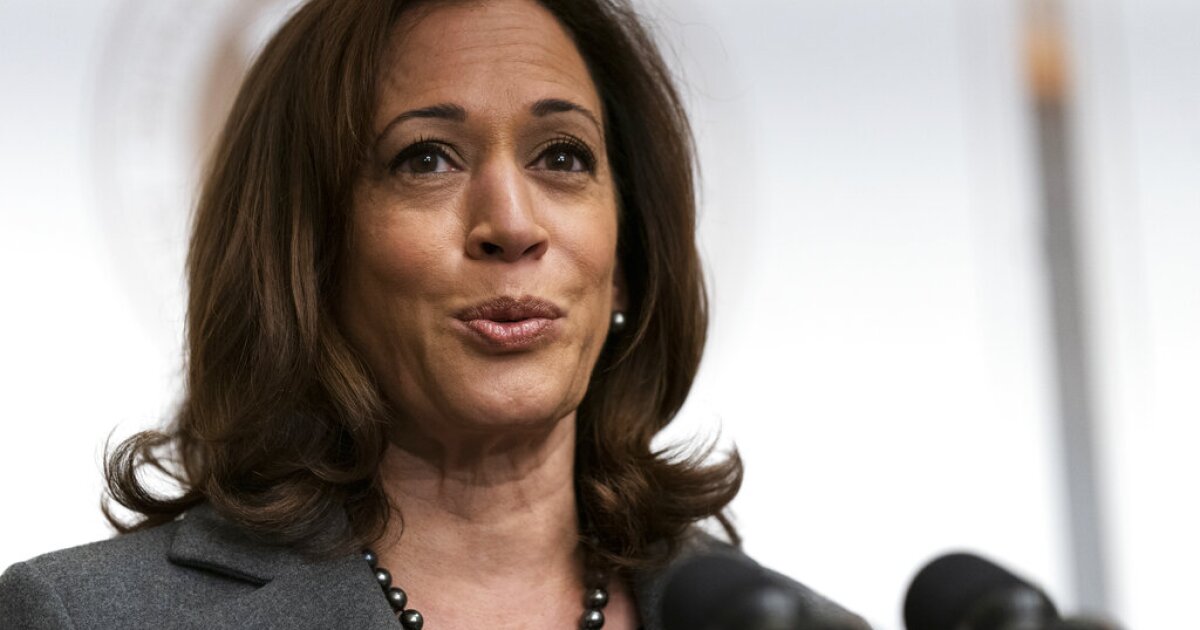

Nearly a decade ago, Vice President Kamala Harris laughed at the prospect of legalizing marijuana in California, even as her Republican opponent embraced reform in the race for attorney general.
But Harris, once a hard-nosed prosecutor, rallied behind the Biden administration’s decision last week to pardon all federal convictions of simple marijuana possession, a surprise announcement delivered in the countdown to the midterm election.
“Speaking of the system of justice, we are also changing — y’all might have heard that this week — the federal government’s approach to marijuana,” Harris said to applause at the 2022 Texas Democratic Party Johnson-Jordan reception on Sunday. “The bottom line there is: Nobody should have to go to jail for smoking weed.”
President Joe Biden last week pardoned roughly 6,500 people convicted in federal court of simple marijuana possession and thousands more charged in Washington, D.C. The president also ordered a review of cannabis’s Schedule I status, which could begin the process of federal legalization.
‘ETHICS NIGHTMARE’: TEMPORARY BIDEN STAFFERS RAISE FINANCIAL DISCLOSURE CONCERNS
“Sending people to jail for possessing marijuana has upended too many lives — for conduct that is legal in many states,” Biden tweeted following the announcement. “That’s before you address the clear racial disparities around prosecution and conviction. Today, we begin to right these wrongs.”
The decision comes just weeks before the midterm elections, with aides framing the move as Biden “following through on his campaign commitment.”
The Biden administration’s mass pardon for cannabis offenders has renewed attention on Harris’s record as a top California prosecutor before her election to the Senate in 2018.
Support for legalization has grown over the years and is especially popular among younger adults. Critics say Harris was slow to adopt the position. During the 2020 presidential campaign, Democrats hammered California’s former top cop for her record of cannabis prosecutions.
On a debate stage in Detroit, Tulsi Gabbard, then a Hawaii representative and rival for the Democratic nomination, said Harris had the power to enact change but didn’t.
“She put over 1,500 people in jail for marijuana violations and then laughed about it when she was asked if she ever smoked marijuana,” Gabbard said, telling Harris that those who “suffered under [her] reign” deserved an apology. “The bottom line is when you were in a position to make a difference and an impact in these people’s lives, you did not.”
Gabbard recently accused Harris of “hypocrisy” amid efforts to bring WNBA player Brittney Griner back to the United States from Russia.
During her tenure as California attorney general, some 1,560 people were sent to state prisons for cannabis-related offenses between 2011 and 2016, according to state corrections data analyzed by the Washington Free Beacon.
After Harris became the vice presidential nominee, some defended her as a leading progressive during her time as San Francisco district attorney. Others credited her predecessor with the reforms.
Before the presidential race was underway, Harris said she supported the legalization of marijuana, including while a senator in a 2017 speech at the Center for American Progress, through legislation co-sponsored with Sen. Cory Booker (D-NJ), and in an autobiography released before her 2020 presidential run.
In The Truths We Hold, Harris wrote it was “past time” officials work toward “dismantling the failed war on drugs — starting with legalizing marijuana.”
Appearing on The Breakfast Club, a New York radio show, Harris pushed back on those who said she opposed reform, joking, “Half my family’s from Jamaica. Are you kidding me?” A presidential hopeful then, she also bragged about smoking marijuana in college.
However, the former California attorney general indicated a more nuanced position, calling for scrutiny of the “impact of weed on a developing brain” and raising safety concerns.
“The other issue that we’ve got to address is how we’re going to measure impairment when somebody has been smoking weed, in terms of driving,” she added.
Harris’s record in California as attorney general, district attorney, and prosecutor before her election to the Senate drew increased scrutiny as she entered the presidential arena in 2019, with voters seizing on her record.
During a 2019 Iowa town hall, Harris was pressed to reconcile her progressive bona fides with her prosecutorial record. Asked to explain her “tough on crime mentality,” Harris pushed back on the charge, arguing that she had worked to reform the criminal justice system throughout her career.
“I’ve been consistent my whole career,” Harris said.
The criminal justice reform climate has shifted over the years, with Harris sometimes leading the change and trailing it at others.
Harris said in a 2017 speech at the Center for American Progress that she employed a “smart on crime” approach to drugs as California’s top prosecutor. But as California’s attorney general, Harris was largely silent on progressive marijuana policies, even as others, like then-Lt. Gov. Gavin Newsom, embraced legal cannabis.
In 2010, California introduced a ballot measure to legalize marijuana in the state. Harris, like other prominent Democrats, opposed the measure known as Proposition 10, raising concerns that it could lead to “driving while high.”
“Spending two decades in courtrooms, Harris believes that drug selling harms communities,” her then-campaign manager said. “Harris supports the legal use of medicinal marijuana but does not support anything beyond that.”
That measure failed, and Harris remained opposed to legalization through 2015 while facing off against a Republican challenger for attorney general who backed recreational cannabis. “He’s entitled to his opinion,” Harris said to a local NBC News affiliate, laughing.
A spokesperson later told the network that Harris “believes that this is an evolving issue that requires that we monitor what is happening in Colorado and other states and that, ultimately, this should be up to a vote of the people.”
Harris’s 2016 campaign said she did not take positions on ballot measures but was otherwise generally supportive of legalization. Amounts of marijuana up to an ounce were decriminalized for personal use in California from 1975 while selling the drug remained illegal until Proposition 64 passed in 2018.
Yet in the years leading up to this, Harris sometimes alienated those pushing for reform in the state.
CLICK HERE TO READ MORE FROM THE WASHINGTON EXAMINER
Harris declined to join a bid to remove marijuana from the Drug Enforcement Administration’s list of most-dangerous substances while she was attorney general and was accused of failing to help the state’s cannabis industry during a 2011 federal crackdown.
In a Nov. 11 interview with the New York Times, Harris said that she thought federal officials were “ill-equipped” to determine which dispensaries were in violation but conceded that California law on the issue was “vague and chaotic.”
By the time Harris was elected attorney general, she had lost the support of the state’s marijuana advocates.







